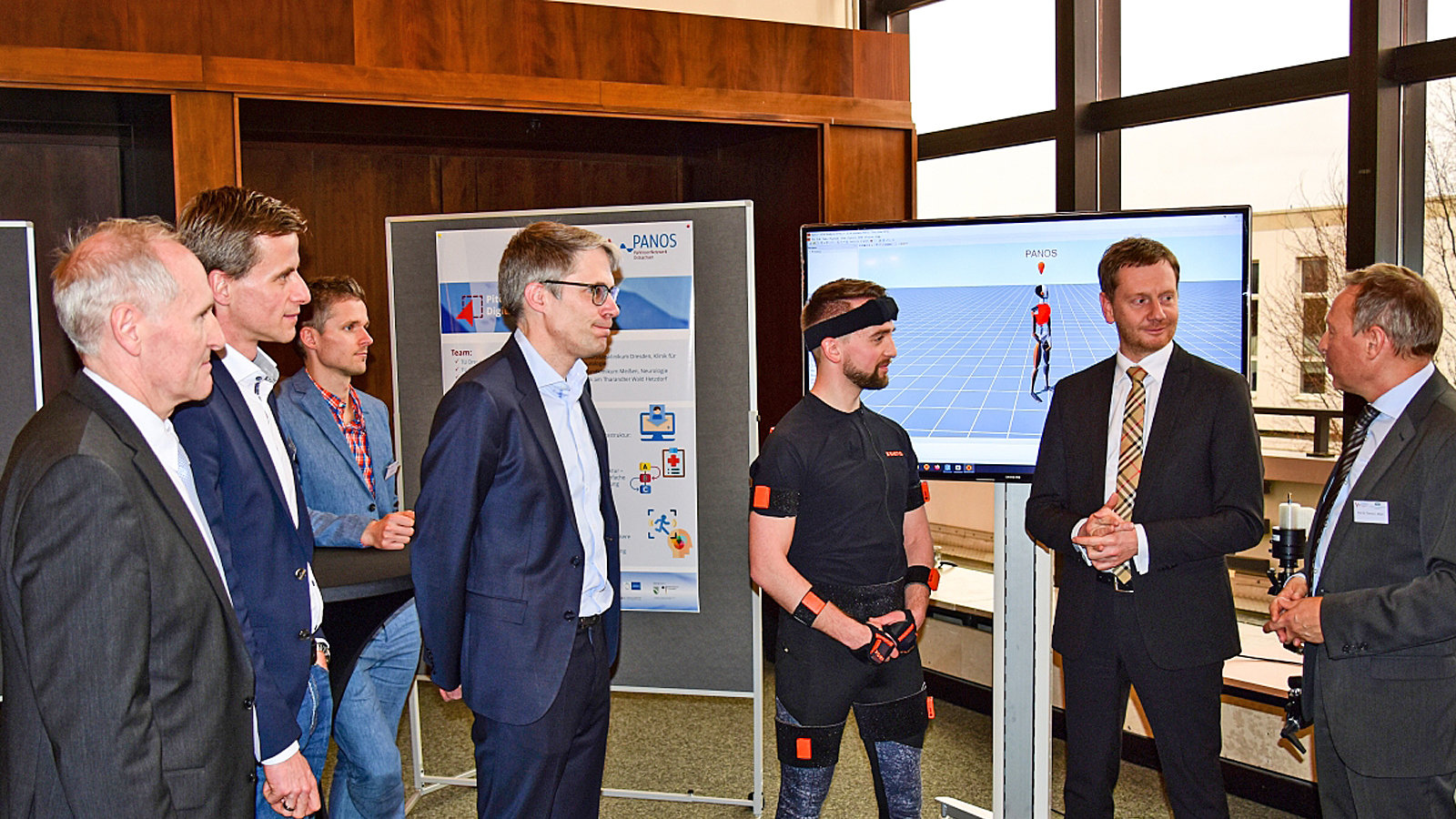Advancing Comprehensive Parkinson’s Care
Millions awarded to the “PANOS” Parkinson’s network in eastern Saxony – including the Professorship of Human Locomotion at Chemnitz University of Technology
-

Prof. Dr. Thomas Milani from the Professorship of Human Locomotion at Chemnitz University of Technology (right) stands with Michael Kretschmer, Prime Minister of Saxony (2nd from right), and explains a system that can be used to precisely record and evaluate changes in motor skills. Also pictured, from left: Dr. Peter Themann, Dr. Martin Wolz, Tobias Heß, research associate at the Professorship of Human Locomotion at Chemnitz University of Technology, Dr. Kai Löwenbrück and Bert Wynands, research associate at the Professorship of Human Locomotion at Chemnitz University of Technology. Photo: Holger Ostermeyer/University Hospital Carl Gustav Carus
On 23 January 2020, Saxon Prime Minister Michael Kretschmer and State Minister Petra Köpping awarded funds to the tune of 6.8 million euros to the “Parkinson Network East Saxony” (PANOS) research and transfer project. These funds, from both federal and state sources, are a part of the fossil fuel phase out program and were awarded at the Lausitzhalle (Hoyerswerda).
As a part of the PANOS project, a standardized digital care concept will be created. At the core of this stands a digital patient file that will be accessible by all relevant care providers, including the general practitioner, Parkinson’s specialists and locomotion professionals. Based on a standardized care plan, the necessary steps for treatment and current status of the treatment will always be transparent and available for the providers. The aim of this project is to secure the supply of options for care and therapy for Parkinson’s, especially in rural areas, now and moving forward.
PANOS consists of, among others, representatives from the Saxon State Medical Association (SLÄK), the clinic in Tharandter Wald, the University Hospital Carl Gustav Carus (Dresden) and Chemnitz University of Technology. The Professorship of Human Locomotion at Chemnitz University of Technology will be taking part primarily in the research area of diagnostic and therapeutic care of patients with Parkinson’s.
Of particular focus in this project is the integration of modern, sensor-based measuring batteries, including automated, intelligent symptom monitoring. Currently, only simple motor tests are used in the diagnosis and monitoring of Parkinson’s. However, current technology allows for more precise recording of symptoms involving motor skills and the overall course of the disease. Sensors such as those in the realm of this project can precisely record the movement of the patient in three-dimensional space. Researchers can then identify meaningful indicators of the overall progress of the disease. Beyond this, other tests can measure balance, vibration sensitivity, cognitive capability and disorders involving impulse control. The aim of this comprehensive sensor network is to map out the disease more precisely and, ideally, improve the treatment and medication of it. This measuring battery is to be set up at three locations – Hetzdorf (Parkinson Centers), Dresden (University Hospital) and Meißen (Elbland Clinic).
“We are pursuing a higher quality and differentiated assessment of symptoms diagnosis, as well as the recording of patient-based dynamics of change over time, in order to manage the course of the disease and optimise therapeutic approaches to it,” explains Prof. Dr. Thomas Milani. With this, Chemnitz University of Technology is doing its part within the framework of PANOS to address the need for increased care due to increasing patient loads, especially in rural areas.
For more information, please contact Prof. Dr. Thomas Milani from the Professorship of Human Locomotion at Chemnitz University of Technology, Phone 0371 531-34536, E-mail thomas.milani@hsw.tu-chemnitz.de.
(Article: Matthias Fejes / Translation: Jeffrey Karnitz)
Matthias Fejes
07.02.2020




